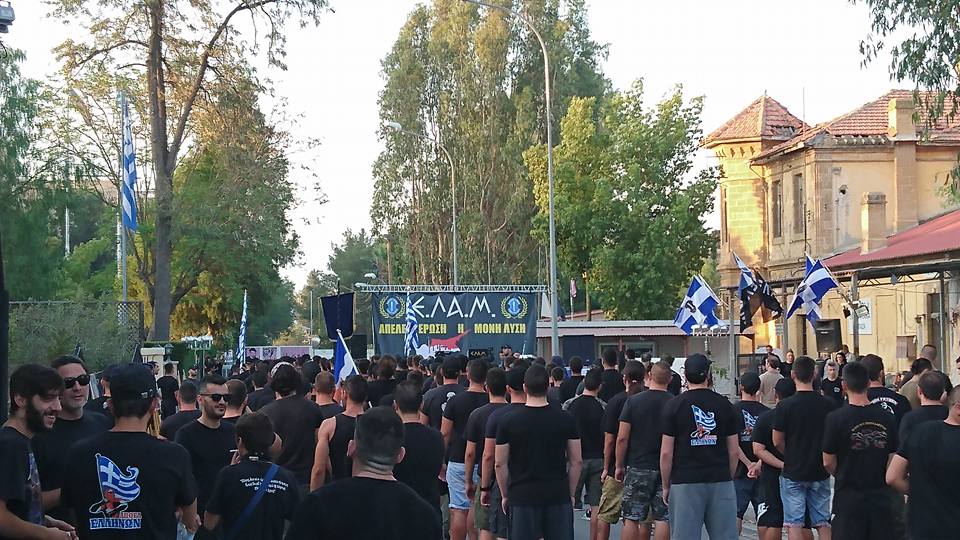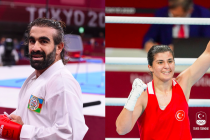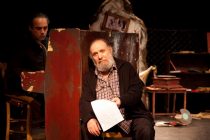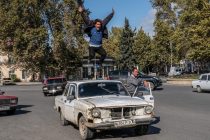“What is this protest about?” I asked a group of young men sitting on the sidelines of a mass rally on the southern side of Nicosia’s Ledra Palace crossing.
They took one look at me, all of them with the same unwelcoming frowns, before raising their hands to indicate that they would not speak to me.
“We’re protesting against the f***ing Turks,” one elderly man suddenly called out from a nearby cafe.
Unlike everyone else at the rally, he was not dressed in all-black. He was wearing a white shirt and had been simply passing by when the convoy of buses brought the hundreds of demonstrators from all over the Greek Cypriot-controlled territory.
Nonetheless, he clearly sympathised with them. His face was twitching with hatred and rage. Although this made me feel uneasy on the inside, I had to keep up the act. Any sign that I was intimidated might have blown my cover.
“Are they protesting against Turkey or the Turkish Cypriots?” I proceeded to ask the man.
“All of them,” the man replied. “We hate them all.”
Of course I knew very well what the protest was about. I had got wind that the Greek Cypriot neo-Nazi party ELAM was planning to hold the protest a week earlier.
They chose to hold it on July 20th, marking the 43rd year since Turkey militarily intervened in Cyprus following a coup by the Greek junta which aimed to unite the island with Greece.
Turkey, Turkish Cypriots: “We hate them all.”
On that day, they vowed to “drink the blood of the Turks” in “revenge” for the intervention, which saw the island split in two, into the Turkish Cypriot-controlled North and the Greek Cypriot-controlled South.
Being a Turkish Cypriot, I knew I was taking a huge risk by infiltrating their rally. Everyone I had spoken to about my intentions had sincerely advised me not to go.
But I was determined to attend and get as close to the action as possible. I wanted to show the real face of Greek neo-Nazism in Cyprus with pictures and footage from the scene, and I was relying on my experience as a journalist on doing that. After all, it would not be the first time I’ve found myself in a dangerous situation.
So I decided to go to the protest disguised as a curious Hungarian tourist. Why Hungarian? Because I just happpened to own a cap that has Budapest written on it.
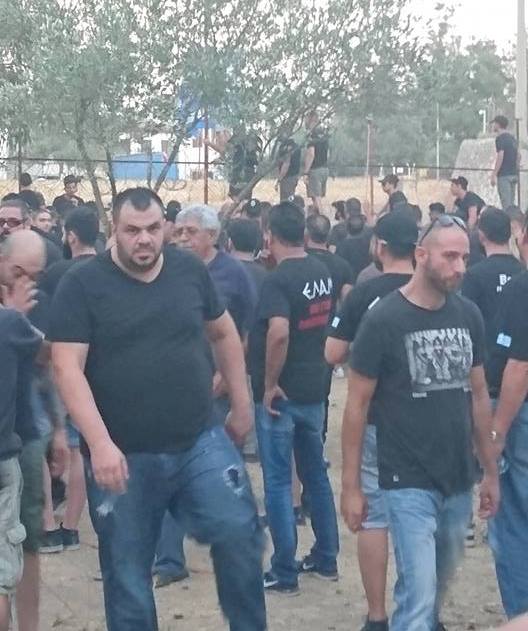
As a journalist you learn a few tricks to keep your identity concealed in such situations. Firstly, the key to outsmarting someone is to make them feel that they are smarter than you, and the way to do that is to learn how to act unlearned. That was the hardest part of the evening. Even the smallest slip up would have given me away.
I also had to take a number of precautions before I even turned up at the rally just in case I attracted negative attention and they decided to check my identity.
The most obvious precaution was to hide my ID documents, including my British passport as I was sure that ELAM supporters would not care so much about my nationality once they discovered my Turkish name. I hid my ID in my shoes.
“I took a number of other precautions. I didn’t want them identifying me”
Besides that, I took a number of other precautions. I removed my Turkish SIM card from my phone and deleted all my phone applications and photographs. I didn’t want them identifying me through social media in case they checked my phone. I also made sure I didn’t bring any Turkish bank cards or cash on me, and even went as far as removing Turkish labels from my clothing and the wrapper on my bottle of water.
Indeed, it was a shame that in this day and age in a European Union member-state I had to go to such lengths to conceal my identity for my own safety, but I could not rely on the Greek Cypriot police to protect me. In many instances where Turkish Cypriots were attacked by ELAM supporters in the south, the Greek Cypriot police stood aloof. We even saw this in 2014 when former Turkish Cypriot president Mehmet Ali Talat, who was known for his pro-peace stance, was attacked with small explosives at a conference in Limassol that also hosted the American ambassador to the island.
And, as expected, there were only a handful of Greek Cypriot police officers guarding the gathering of some 200-300 ELAM supporters as they marched towards the Ledra Palace checkpoint.
Shortly after the protest started, a group of around 100 ELAM supporters rushed the fence behind the Greek Cypriot Kyrenia Municipality building, which was the only thing separating them from the UN-controlled buffer zone that divides the island. Again, the Greek Cypriot police just stood by and watched idly.
As they were storming the border, a small explosion was heard. I wasn’t sure if it was a firework left off by the ELAM supporters themselves, or if it was some kind of warning shot or sound bomb fired by Turkish border guards to deter them.
Even the elderly man who was watching the events with me became extremely concerned when he saw what was happening. By that point I had fully convinced him that I was a Hungarian tourist and I think he developed some kind of bond with me as I listened patiently for an hour to his rants about how much he hates Turks, the British and Jews. He particularly referred to Jews in very harsh words, calling them “dirty gypsies”.
“I fought the Turks,” he said as I brought him a chair to sit on because his tired legs could stand no longer. “But before that, I fought the British.”
He lifted up his shirt to show me scars he picked up while being held in a British prison in Cyprus before the island gained independence in 1960. “They broke three of my ribs,” he remarked.

Interestingly, he told me that I should study the Bible but admitted to me that he was not a Christian. “I am Hellenic,” he said, referring to the pre-Christian beliefs of the Ancient Greeks.
As he explained the metaphorical meanings behind Ancient Greek religion to me, I noticed a Greek Orthodox priest among the crowd of ELAM supporters, but I could not tell if he was there as a supporter or to convince the enraged youth who had gathered around him to calm down. Either way, his presence seemed to make no difference to them.
The elderly man continued to explain to me how the Turkish “occupation” of northern Cyprus was some kind of Jewish conspiracy against the Greeks in their bid to control everything from the Nile to the Euphrates. “Read the Bible,” he said to me. “It explains everything.”
I then asked if the conflict in Cyprus was one based on ethnicity; that being a rivalry between Turks and Greeks, or one based on religion between Muslims and Christians.
“We are against the Turks,” he said, adding that there are many Arab Muslims who live peacefully in the Greek Cypriot south of the island without problems.
“Is it safe for me to go to the Turkish side?” I asked – a typical question posed by many foreign tourists visiting the south.
“I will not lie to you,” began the 79-year-old, “I have never been there and I don’t want to go, but if you want, you can go.”
It was then that I told him that I would go to the border fence to get some pictures and come back. He advised me not to, as if he was looking out for me, but I went anyway.
Due to the large crowd, I couldn’t get close enough to the fence to see how many ELAM supporters had jumped down into the football pitch in the buffer zone below, or if there were any UN peacekeepers preventing them from crossing into the Turkish side, but I managed to capture footage of ELAM supporters scouring the fence and shouting abuse at a group of Turkish Cypriots who had gathered on the opposite side of the buffer zone in the Arabahmet area.
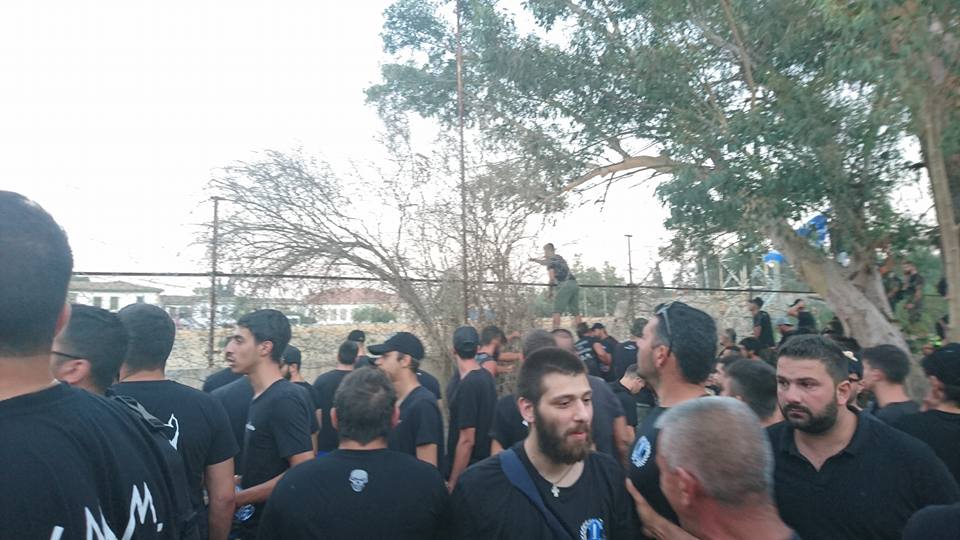
It wasn’t long before I attracted attention, however, and I was quickly surrounded by ELAM supporters yelling at me in Greek.
“It was that moment that I realised I was in danger”
They told me to stop filming. I lied and said I had permission to film. After all, there were a few journalists there taking pictures, but obviously I left my Anadolu Agency accreditation behind so they wouldn’t find out that I’m a Turkish journalist. One of them then attempted to grab my phone from my hand in a very violent manner. I tussled with him and got my phone back, but it was that moment that I realised I was in danger, so I agreed to stop filming and they let me go.
Satisfied that I had got the footage I was looking for, I decided I had to make a quick escape in case any of them tried to follow me and force me to delete the footage. I backed away to the sidelines of the protest, where the Greek Cypriot police were standing, yet I continued to film when another group of ELAM supporters turned up wearing camouflage and marching in an orderly fashion. They were accompanied by a military band of trumpeters and men holding flames. Everyone then stood still as hundreds burst out in chorus singing the Greek national anthem.
At one point a small skirmish broke out between ELAM supporters who were chanting for rival football teams. A woman left the skirmish screaming desperately at the police to do something. Again, they did nothing, but later some riot police turned up to separate the rival groups.
I had already been at the rally for some two hours when that happened. Things were clearly getting out of control. That was when the elderly man I had been speaking to earlier found me and said it was time to leave. I couldn’t have agreed with him more.
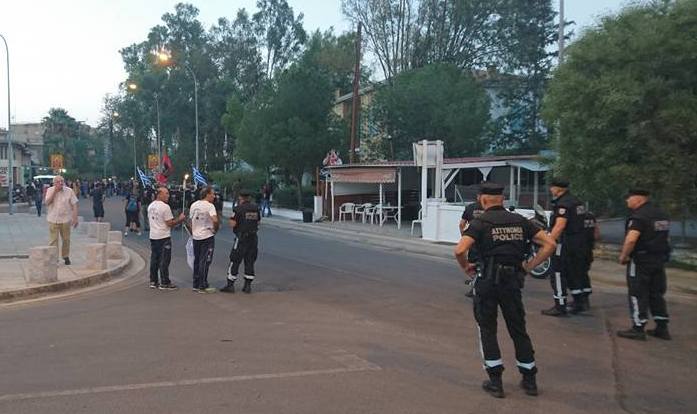
I was planning to meet some Turkish Cypriot friends on the south side of the border near the Lokmaci crossing not far from the location of the protest that evening, but I didn’t want to go directly to them in case I was being followed. The elderly man accompanied me almost as far as Ledra Street to make sure I was safe. My first objective at that point was to find a WiFi signal so that I could publish my pictures.
I walked hurriedly into the local Starbucks where I uploaded the footage onto my page on Facebook, of course after re-installing the app. While I did that, I heard the chants of a group of ELAM supporters who had left the main protest at the Ledra Palace crossing and were making their way to the Lokmaci crossing, just around the corner from where I was hiding.
“When ELAM supporters stormed the border fence, I was scared for them”
I waited a short while for them to leave and decided against visiting my Turkish Cypriot friends in the South. The Greek Cypriot police had already began closing their side of the Lokmaci crossing, so I didn’t want to get stuck in the south with ELAM supporters. The first chance I got, I rushed to the crossing and made my way across to the Turkish side. Once there, I warned the Turkish Cypriot border police to remain extra-vigilant that night because of what had happened at the Ledra Palace crossing earlier. Surprisingly, they seemed completely unaware and oblivious to what was going on, but they appreciated my warning regardless.
It was certainly an extraordinary night, and despite having many political differences with my Greek Cypriot counterparts, I had never seen so much hatred on their half in my life, nor had I ever imagined that this hatred could possibly run so deep among some of the most laid-back people on earth. Of course both sides, Turkish and Greek, have their bad apples and extremists, but as far as I can see the level of fanaticism I witnessed at the ELAM rally that night, their organisation and mobilisation has no equal in the Turkish North.
“ELAM has no equal in the Turkish North”
Despite my ordeal, however, I can honestly say that the only time I genuinely felt fear that night was when the ELAM supporters stormed the border fence. I was scared for them, because I’m aware of the no-nonsense mentality of Turkish soldiers guarding the border.
As for the elderly man who helped me, I feel a degree of gratitude to him in spite of his nasty comments about Turks.
“I see you like my grandson,” he said to me while patting my shoulder and telling me his name was Lucas. “Be careful.”
For my parting question, I asked if he had ever had any Turkish friends. “I have worked with many of them, but they are all disgusting people,” he replied.
“A part of me wishes that I had told him I was a Turkish Cypriot”
A part of me wishes that I had at that moment told him I was a Turkish Cypriot. Perhaps it would have saved an old man from the hatred that has been eating away at him his whole life, or at least relieved him of it a little.
Then again, I was still on enemy turf and I couldn’t afford to let my guard down in case he informed the ELAM supporters of my true identity. With a sprained ankle still not fully recovered, I wouldn’t have been able to run very fast even if I had my emergency escape route figured out.
But if it’s any consolation, I just want to tell Lucas and Greek Cypriots who sympathize with him that no matter how much hatred you may feel towards me simply because I am a Turkish Cypriot, I consider you all to be my equals and fellow countrymen. I hope that one day we can all put aside our differences and unite under a fair and durable solution so that we may be completely freed of the hatred that divides us.
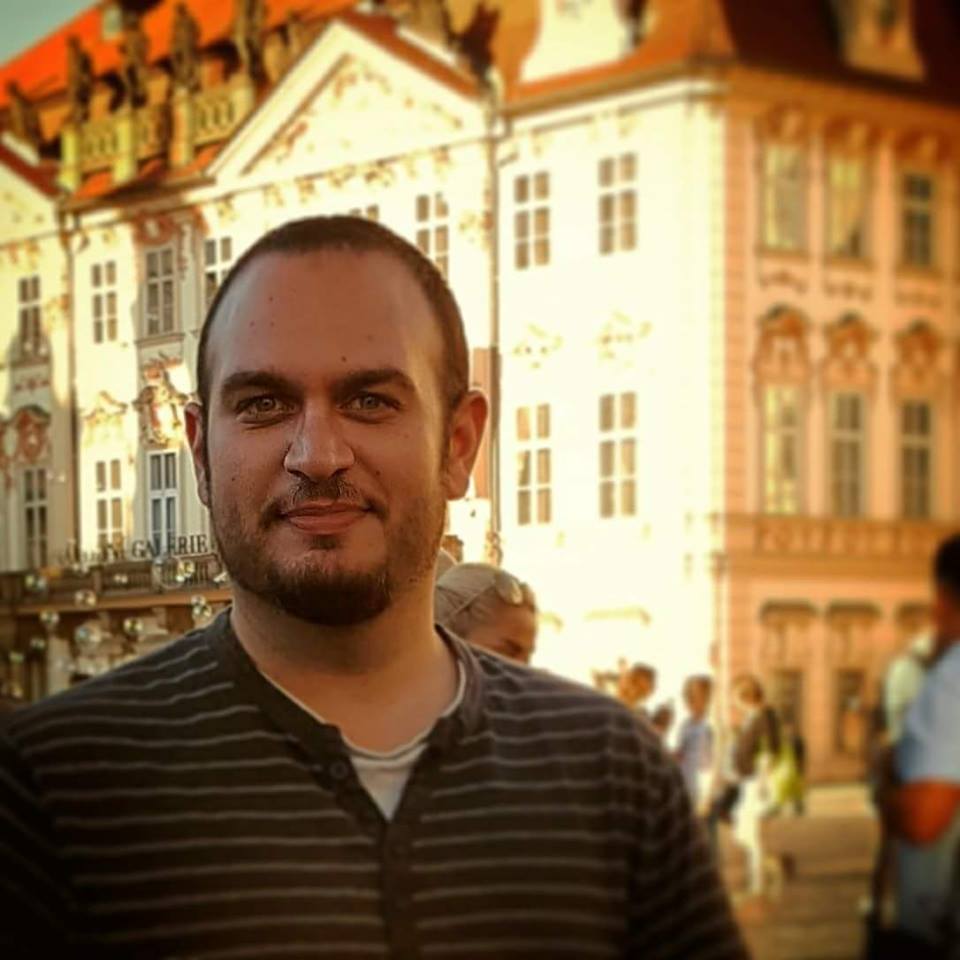
I’ll never know if Lucas would still see me as his grandson if he knew the truth, but throughout my entire interaction with him, I saw him as being no different to my own grandfather and I want to thank him sincerely for protecting me.
Ertan Karpazli is a British-born Turkish Cypriot journalist based in Cyprus and Turkey. He is the co-founder of the Cezire Association and works as a news editor for TRT World.

